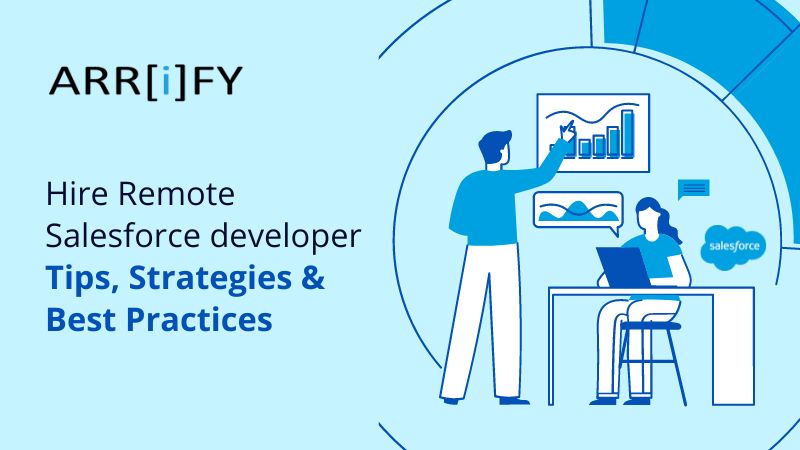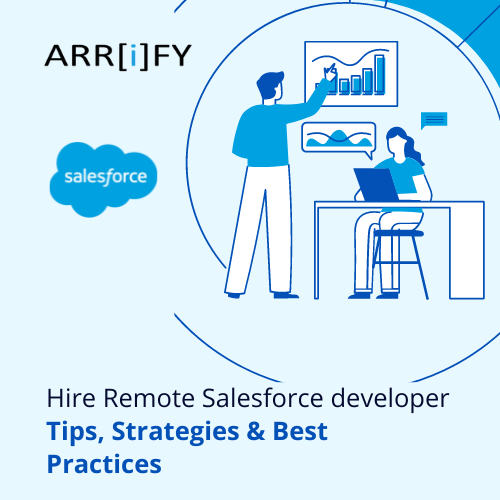
Introduction
Benefits of hiring a remote Salesforce developer:
Hiring a remote Salesforce developer can offer several benefits to your business. Some of the benefits of working with a remote developer include:
- Access to a wider pool of talent: By hiring remotely, you can access a larger pool of qualified candidates, rather than being limited to those within commuting distance of your office. This can be particularly useful if you are looking for specific skills or experience that are not readily available in your local market.
- Flexibility and cost savings: Working with a remote developer can be more cost-effective than hiring a full-time employee, as you do not have to provide office space or pay for overhead costs. In addition, a remote developer can offer flexibility in terms of working hours and location, which can be beneficial for businesses with fluctuating workloads or global operations.
- Improved productivity: Studies have shown that remote workers can be more productive than their office-based counterparts, as they often have fewer distractions and are able to focus on their work more effectively.
How to determine your needs for a remote Salesforce developer:
Before you start your search for a remote Salesforce developer, it’s important to clearly define your needs and goals. Consider the following questions:
- What specific tasks or projects will the developer be responsible for?
- What skills and experience are required to successfully complete these tasks?
- What are your budget and resource constraints?
- How will the developer fit into your existing team and workflows?
- What is your timeline for completing the work?
Having a clear understanding of your needs will help you to identify the right candidate and set realistic expectations for the project.
Finding the right candidate
Tips for identifying the right skills and experience
When searching for a remote Salesforce developer, it’s important to identify the skills and experience that are necessary to successfully complete your project. Some specific skills and knowledge to look for in a Salesforce developer include:
- Proficiency in Apex, the proprietary programming language of Salesforce
- Experience with the Lightning platform and the Lightning Components framework
- Knowledge of data modeling and best practices for data management in Salesforce
- Experience with integrations and API development
- Familiarity with Salesforce release cycles and the latest features and best practices
In addition to technical skills, consider the interpersonal and communication skills that are important for a remote developer to have. For example, the ability to clearly communicate project updates and collaborate with team members is essential for a successful remote working relationship.
Strategies for sourcing and recruiting remote Salesforce developers:
There are several strategies you can use to find and recruit qualified remote Salesforce developers:
- Use online job boards and recruiting platforms to post job listings and find candidates.
- Utilize your professional network and ask for referrals from colleagues or industry contacts.
- Partner with a staffing agency or recruiting firm that specializes in placing remote Salesforce developers.
- Attend industry events and conferences to network with potential candidates.
When recruiting remotely, it’s important to clearly communicate the expectations and requirements of the role, as well as the benefits of working with your company. You may also want to consider offering incentives or benefits that are specific to remote workers, such as flexible work schedules or the ability to work from home.
Onboarding and managing a remote Salesforce developer
Setting up a successful remote work environment:
To ensure a smooth transition to working with a remote Salesforce developer, setting up a supportive and effective remote work environment is important. Some key considerations include:
- Providing the necessary equipment and tools: Make sure that the developer has the necessary hardware, software, and other resources to be able to work effectively.
- Establishing clear communication channels: Set up a system for regular communication and updates, such as daily check-ins or weekly team meetings.
- Defining roles and responsibilities: Clearly communicate the expectations and responsibilities of the role to the developer, as well as any specific goals or deadlines for the project.
- Providing access to resources and support: Make sure the developer has access to any relevant documentation or resources, as well as a point of contact for support or assistance.
Tips for effectively communicating and collaborating with a remote team:
Effective communication and collaboration are crucial for the success of a remote working relationship. Some strategies for effectively working with a remote Salesforce developer include:
- Setting clear goals and expectations: Make sure that the developer has a clear understanding of the scope and objectives of the project.
- Using project management software: Tools such as Asana or Trello can help to keep track of tasks and deadlines and facilitate communication between team members.
- Using video conferencing: Video calls can help to build personal connections and improve communication, particularly when working with a remote team.
- Establishing regular check-ins: Regular catch-ups, whether daily or weekly, can help to keep the team aligned and ensure that everyone is on track.
Best practices for working with a remote Salesforce developer
Setting clear goals and expectations: To ensure that a remote Salesforce developer is able to effectively contribute to your project, it’s important to set clear goals and expectations for their work.
This includes outlining the specific tasks and responsibilities of the role, as well as any deadlines or milestones that need to be met. It can also be helpful to establish regular check-ins or progress reports to ensure that the developer is on track and that any issues or concerns can be addressed in a timely manner.
Managing time zones and work schedules: When working with a remote developer, it’s important to consider the time zone differences and work schedules. Make sure to establish clear communication expectations and availability, and consider using tools such as a shared calendar to coordinate schedules.
Ensuring data security and privacy: When working with sensitive data, it’s important to ensure that appropriate measures are in place to protect data privacy and security.
This may include using secure communications channels, such as encrypted email or messaging, and implementing security protocols for accessing and handling data. Make sure to clearly communicate your data security expectations to the remote developer and provide any necessary training or resources to ensure compliance.
Conclusion
Recap of the key considerations for hiring and working with a remote Salesforce developer:
In this guide, we have covered the key considerations for hiring and working with a remote Salesforce developer. Some of the main points to keep in mind include:
- The benefits of hiring a remote developer, include access to a wider pool of talent, cost savings and improved productivity
- The skills and experience to look for in a Salesforce developer
- Strategies for finding and recruiting a remote developer
- Setting up a thriving remote work environment and effectively communicating and collaborating with a remote team
- Best practices for working with a remote developer, include setting clear goals and expectations, managing time zones and work schedules, and ensuring data security and privacy
Next steps for finding the right fit for your business:
Now that you have a better understanding of the considerations for hiring a remote Salesforce developer, it’s time to start your search for the right fit for your business. Use the tips and strategies outlined in this guide to identify the best candidate for your project and set the stage for a successful working relationship.
Why should I consider hiring a remote Salesforce developer?
There are several benefits to hiring a remote Salesforce developer, including access to a wider pool of qualified candidates, cost savings, and improved productivity. Working with a remote developer can also offer flexibility in terms of work schedules and location, which can be beneficial for businesses with fluctuating workloads or global operations.
How do I find the right remote Salesforce developer for my project?
To find the right remote Salesforce developer for your project, it’s important to clearly define your needs and goals. Consider the specific tasks and responsibilities of the role, as well as the required skills and experience.
You can use online job boards, recruiting platforms, and professional networks to outsource and recruit potential candidates, and consider partnering with a staffing agency or recruiting firm that specializes in placing remote developers.
How do I ensure effective communication and collaboration with a remote team?
Effective communication and collaboration are crucial for the success of a remote working relationship. Some strategies for effectively working with a remote Salesforce developer include setting clear goals and expectations, using project management software, using video conferencing, and establishing regular check-ins.
Are there any cost-saving strategies or alternatives to hiring a full-time remote developer?
There are several strategies you can consider to save costs when hiring a remote Salesforce developer.
For example, you may consider hiring a freelancer or contractor on a project-by-project basis, rather than hiring a full-time employee. You may also be able to negotiate a lower rate by hiring a developer who is just starting out in their career or who is located in a region with a lower cost of living.
Another option is to consider using a remote developer service or staffing agency, which can often provide cost savings by handling the recruitment and onboarding process for you.
What is the average cost of hiring a remote Salesforce developer?
The cost of hiring a remote Salesforce developer can vary widely depending on factors such as the developer’s experience and skills, the complexity and duration of the project, and the location of the developer.
As a rough estimate, you may expect to pay anywhere from $45 to $200 per hour for a remote Salesforce developer, depending on the above factors. However, this is just a general guideline and you will need to consider the specific needs of your project to determine the appropriate budget.
